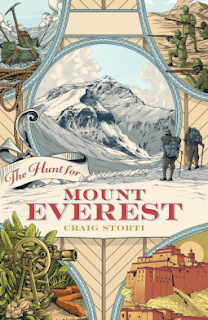My rating: 4 of 5 stars ⭐⭐⭐⭐
The Hunt for Mount Everest documents the 70 year history from the measurement of Mt. Everest in 1850 to the expedition in 1921, when westerners came closest to Mt. Everest, about 40 miles. It would be another 30 years until George Mallory and Tenzing Norgay reached the summit of Mount Everest.
After the 1921 expedition, explorer Francis Youngblood wrote:
The doom of Everest is sealed, for the simple and obvious reason that man grows in wisdom and stature, but the span of mountains is fixed … This doom can be seen to be relentlessly closing in on Everest.
Out of all the passages in The Hunt for Mount Everett, this one haunted me most.
Into Thin Air: A Personal Account of the Mount Everest Disaster by Jon Krakauer documents the 1996 Mount Everest disaster. After a surprise snowstorm, six climbers didn’t make it back to their camp. When the storm finally passed, five of them were dead and the sixth climber was so badly frostbitten that his right hand had to be amputated.
In the epilogue, Krakauer quoted a Sherpa orphan who lost his parents on climbing expeditions:
I never have gone back to my homeland because I feel it is cursed. My ancestors arrived in the Solo-Khumbu region fleeing from persecution in the lowlands. There they found sanctuary in the shadow of 'Sagarmathaji'* …In return they were expected to protect that goddesses’ sanctuary from outsiders. …But my people went the other way. They helped outsiders find their way into the sanctuary and violate every limb of her body by standing on top of her, crowing in victory, and dirtying and polluting her bosom. … even the Sherpas are to blame for the tragedy of 1996 on 'Sagarmatha.' I have no regrets of not going back, for I know the people of the area are doomed, and so are those rich, arrogant outsiders who feel they can conquer the world."
Both these passages refer to doom, but while Younghusband views doom positively in terms of man’s growing “wisdom and stature,” the Sherpa orphan views it negatively in terms of desecrating ‘Sagarmatha.’
* Literally, the mother of the oceans. I like this name better, as many of the great rivers of Asia originate in the Himalayas
Sources (Harvard style)
Krakauer, J., 1997. Into thin air: a personal account of the Mount Everest disaster. 1st ed. New York: Anchor Books.
Storti, C., 2021. The Hunt for Mount Everest. Nicholas Brealey Publishing.

No comments:
Post a Comment